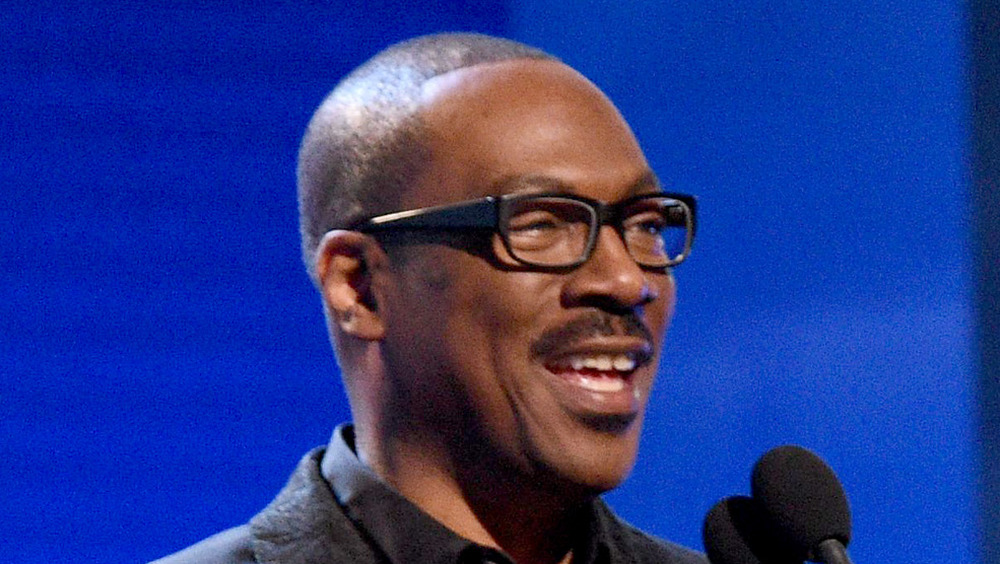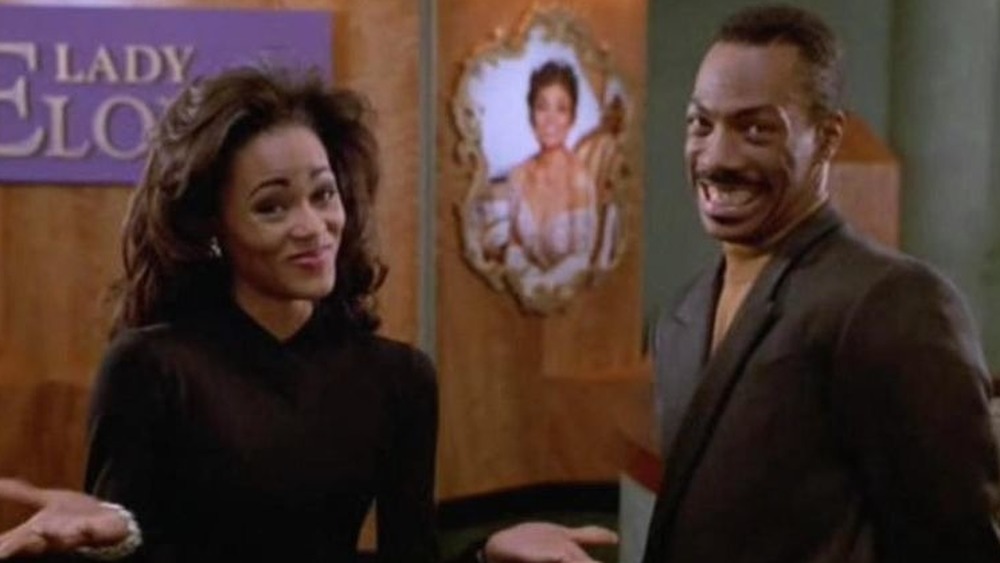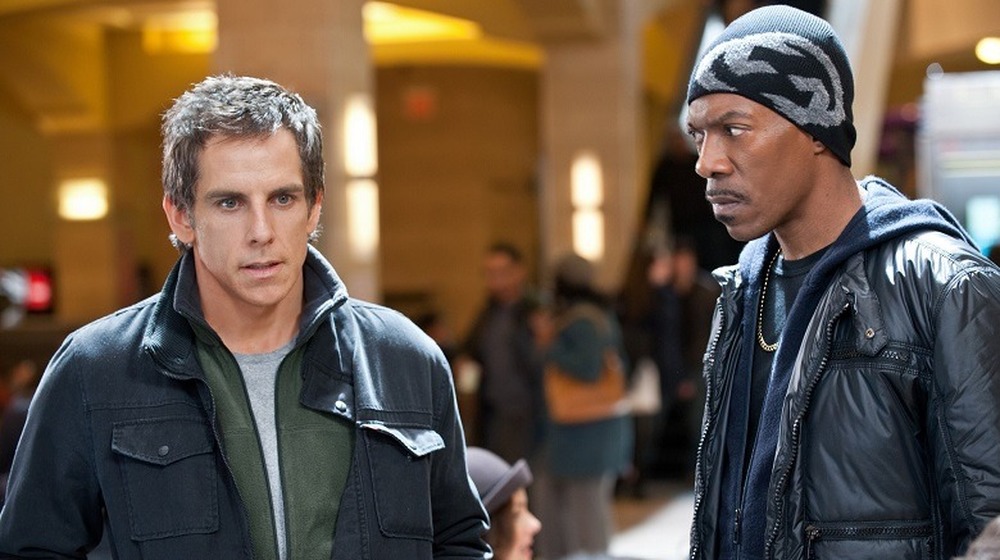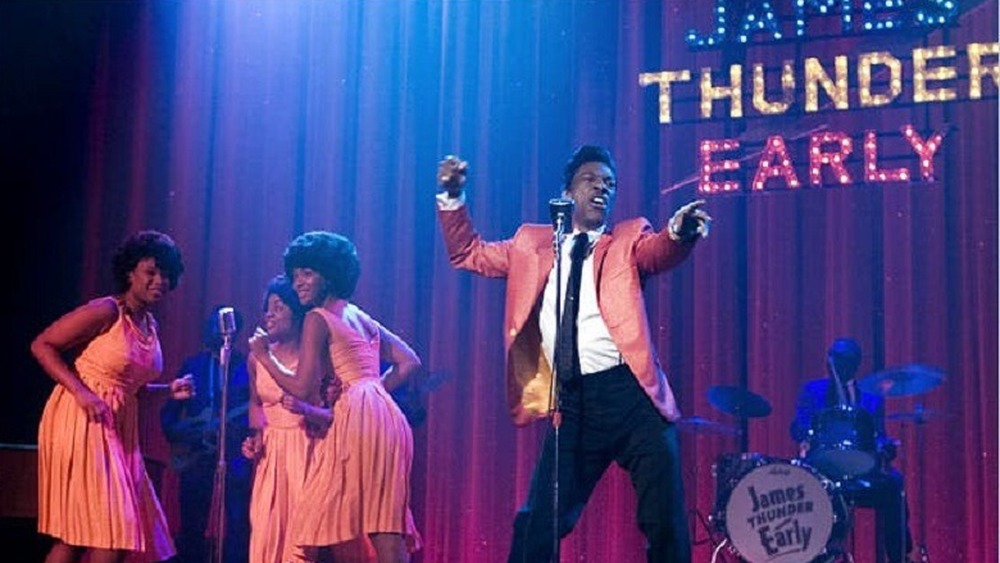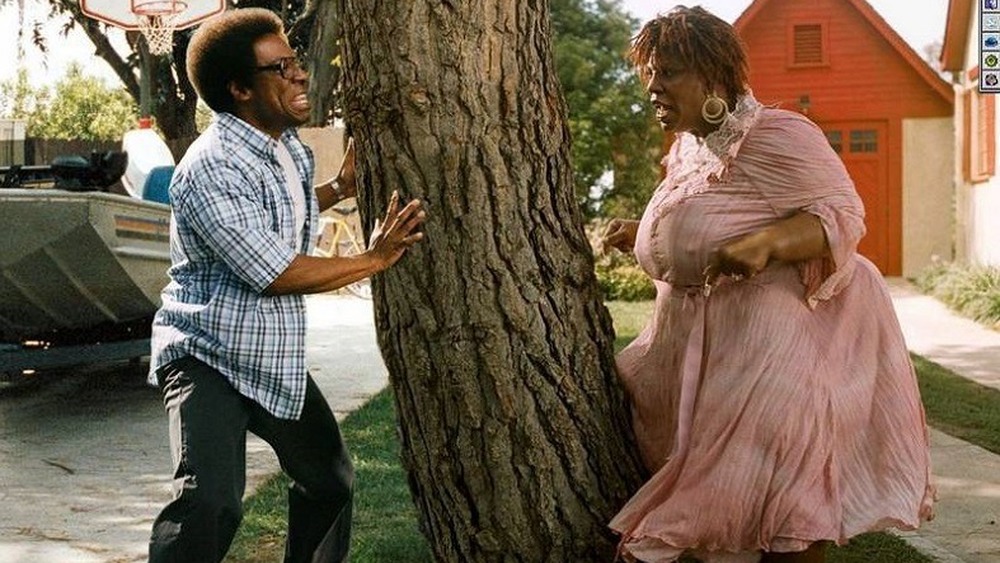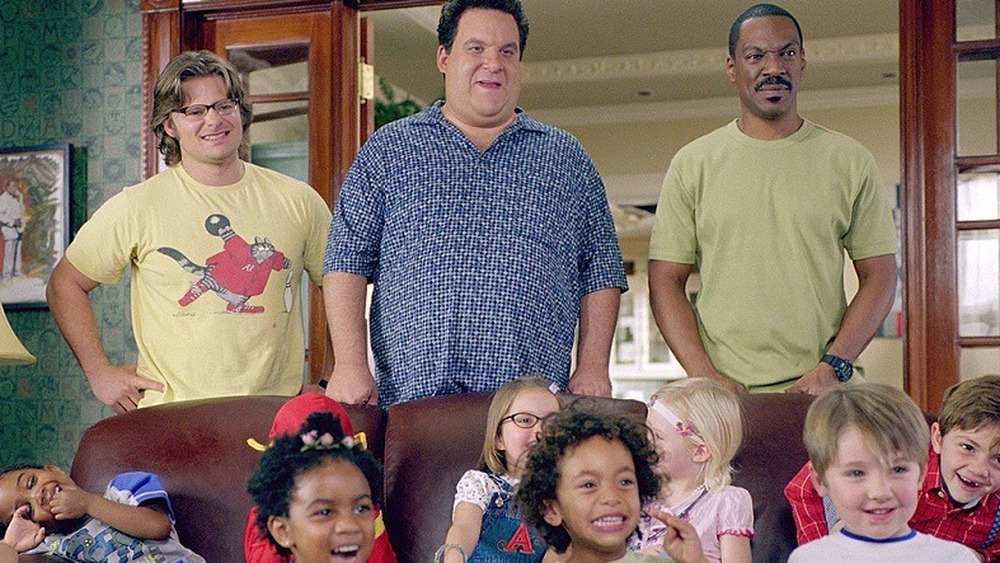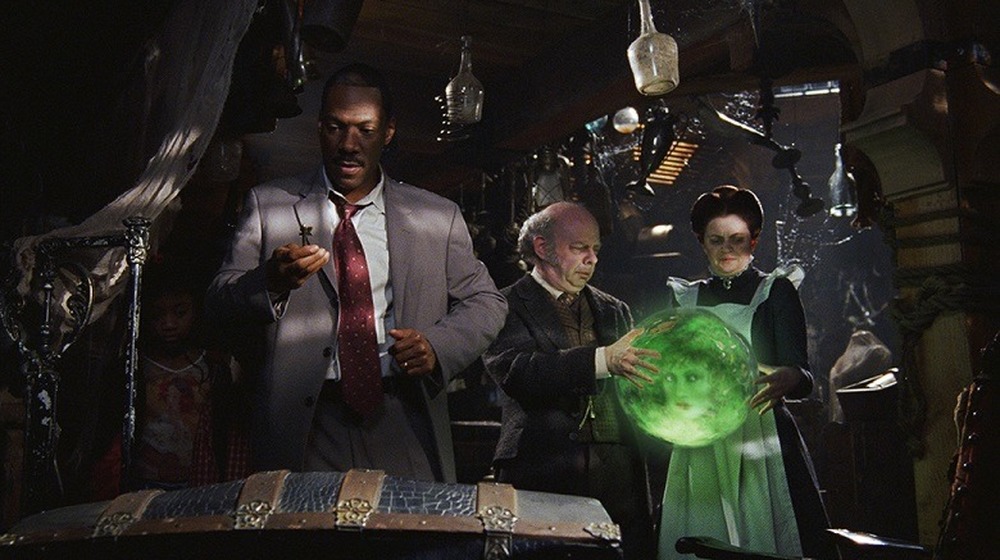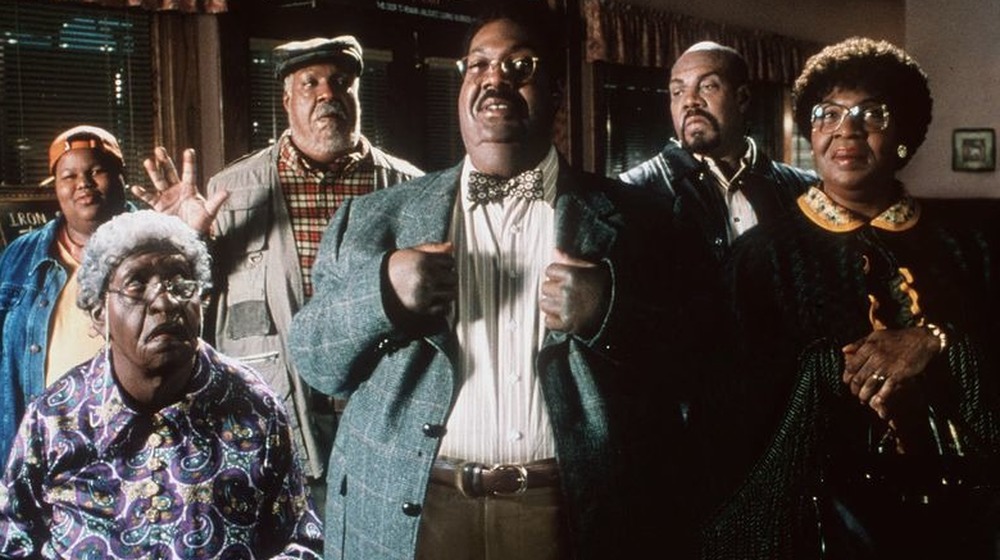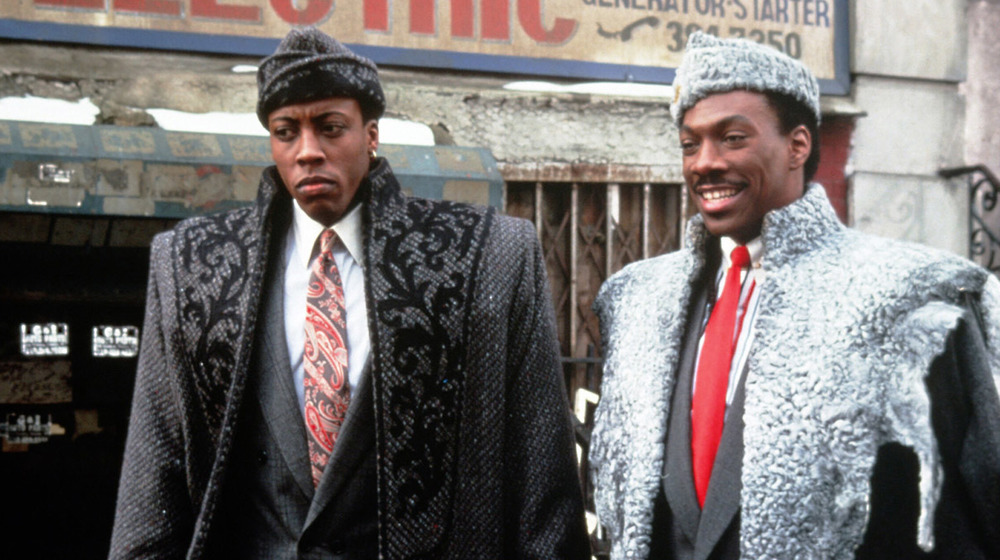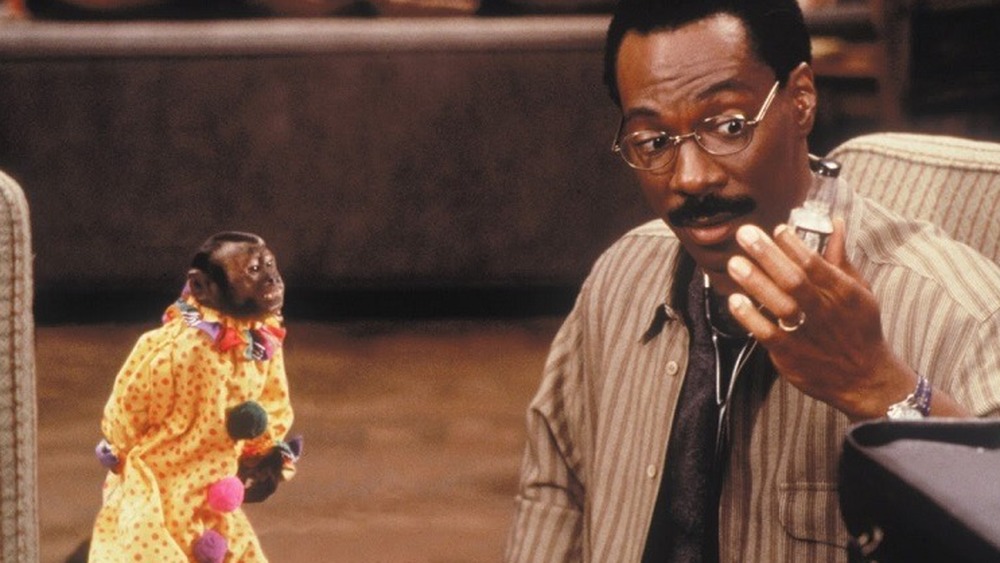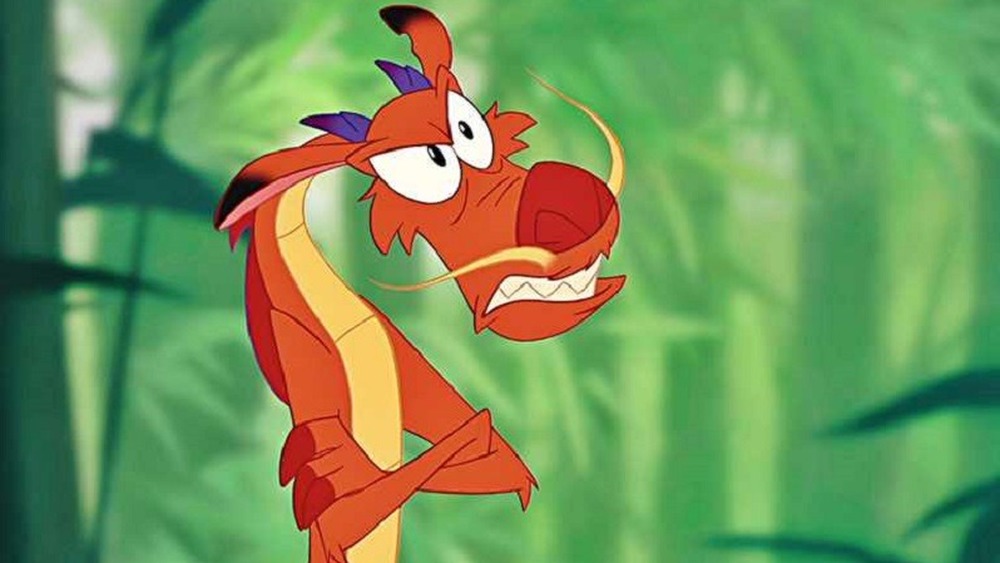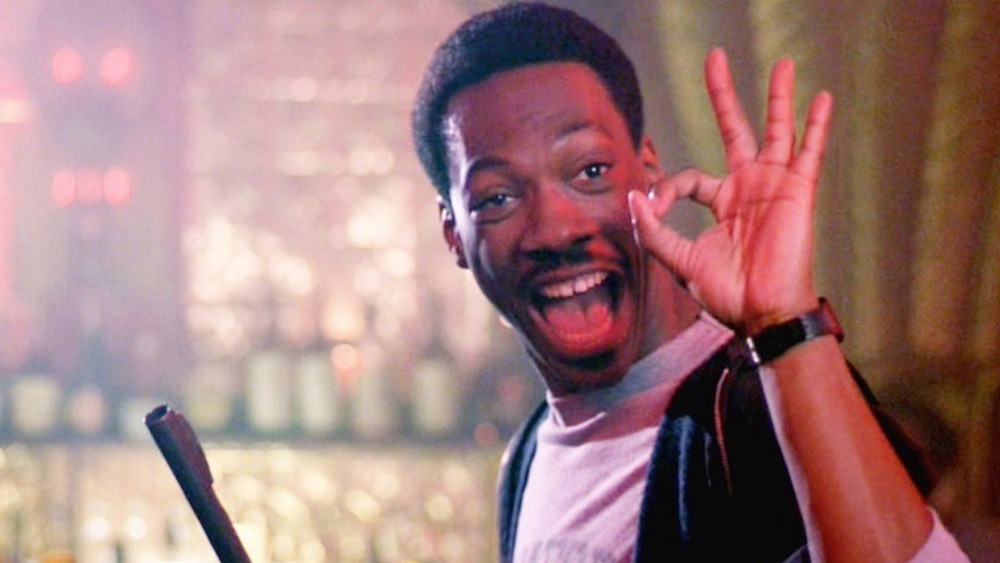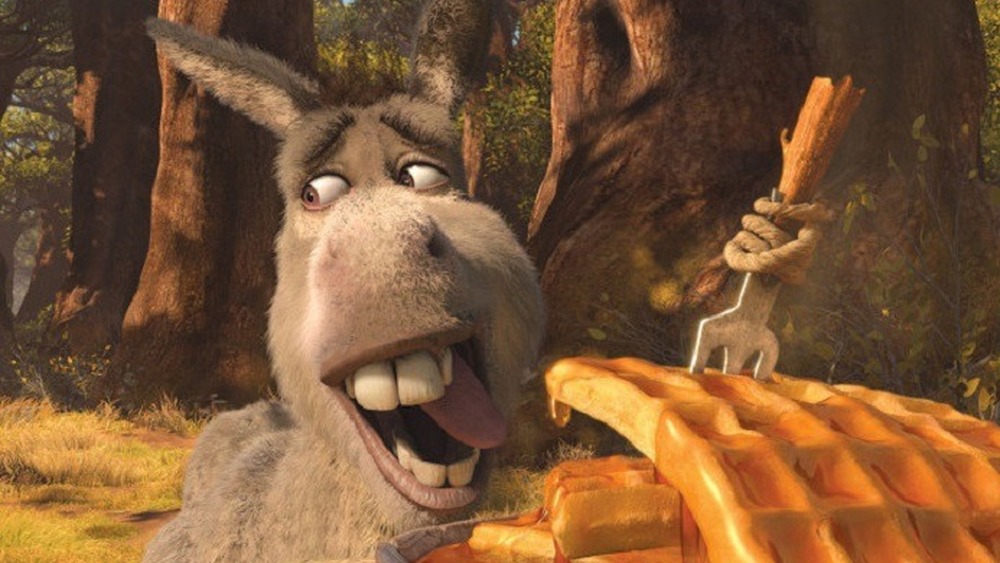The Biggest Eddie Murphy Movies Of All Time
It's safe to say that during his nearly 40-year career, Eddie Murphy has reinvented himself as a box-office star on multiple occasions. He rose to national fame with his scene-stealing appearances on Saturday Night Live and his breathtaking performance as charismatic thief Reggie Hammond in 48 Hrs. His 1987 concert film Eddie Murphy Raw was a mix of stand-up and sketches about his family. It was the rare comedy concert film that got a wide release, and it was highly successful, making over $50 million overall. It had critics comparing Murphy's edgy sense of humor to his hero, Richard Pryor.
However, for as many big hits as Murphy has had, he's had his share of career setbacks. The Golden Child was Murphy's follow-up to Beverly Hills Cop in 1986, and this odd fantasy film was considered to be a disappointment. Every time a film like The Distinguished Gentleman or A Vampire In Brooklyn underperformed, he came back with another big sequel or a broad farce like The Nutty Professor. In the 1990s and early 2000s, he left his edgy persona behind as he made a number of popular movies aimed at kids. Fans who remember him as Reggie Hammond or Axel Foley may be surprised to see how many of his most successful films have fallen into that category. Let's take a look at Murphy's biggest hits, which span action films, romantic comedies, voice-over work, and much more.
Eddie Murphy leads a cast of all-stars in Boomerang
Boomerang was Eddie Murphy's first romantic comedy, playing against type as a cool ad executive breaking hearts and having his own heart broken. The 1992 film earned over $131 million worldwide, despite a tepid critical response. In retrospect, there's a remarkable amount of talent involved, as Reginald Hudlin was chosen to direct after the success of House Party and a young Halle Berry was Murphy's main love interest. Robin Givens was his first love interest and more than Murphy's match as a player. Murphy also shared hilarious scenes with the likes of David Alan Grier, John Witherspoon (the "you've got to coordinate" scene is a particular highlight), Grace Jones, and Chris Rock.
The film's soundtrack was the first one produced by Kenneth "Babyface" Edmonds and Antonio "L.A." Reid. Those producers launched the careers of a number of important artists, including Outkast, TLC, and Usher, and also wrote hits for the likes of Bobby Brown. The Boomerang soundtrack went triple platinum, as the duo introduced a future star in Toni Braxton. Edmonds and Reid actually hung around the studio while the movie was being filmed and met the actors as a way of inspiring their music, and they noted Murphy had a strong hand in guiding the soundtrack. A line from Berry's character inspired the song "Love Should Have Brought You Home." Murphy was a fan of A Tribe Called Quest, who contributed "Hot Sex."
From concept to co-star in Tower Heist
Discussing Eddie Murphy's performance in the 2011 Brett Ratner action-comedy Tower Heist, critic Amy Biancolli said, "He doesn't have much screen time in Tower Heist — just enough to steal it." Co-starring with Ben Stiller, Casey Affleck, Alan Alda, and Matthew Broderick, Murphy was widely praised in his first edgy action role since Beverly Hills Cop 3. After nearly 15 years of doing movies for kids or donning heavy make-up for easy laughs, Murphy returned to his roots as the cool, foul-mouthed criminal Slide helping a group of disgruntled employees rob a building. Tower Heist earned nearly $153 million worldwide.
The film was based on an idea that Murphy himself cooked up in 2005. His initial concept included an all-Black cast robbing Trump Tower as an act of revenge. Early names he had in mind included Chris Rock, Tracy Morgan, Chris Tucker, and Martin Lawrence. Trump Tower was actually used as a shooting location, and Donald Trump was initially pitched as the boss people were trying to get revenge on. The movie went through various permutations until Murphy hopped back on the production five years later. The plot, which revolved around a white-collar grifter who embezzled from others, inadvertently mimicked the real-life Bernie Madoff Ponzi scheme scandal that cost people millions of dollars.
Dreamgirls and the dream of Oscar
Eddie Murphy's impersonations of James Brown on Saturday Night Live were always a highlight, but he had his own musical aspirations. He had a hit in 1986 with the Rick James-produced "Party All The Time," giving him a taste of success. Years later, when offered the role of Jimmy "Thunder" Early in the 2006 film adaptation of the stage hit Dreamgirls, Murphy jumped at the chance. His character drew a little from the swagger of Brown, but in this pastiche about Motown records and the Supremes, Murphy also called on Ike Turner, Jackie Wilson, and Marvin Gaye.
Thanks to an aggressive promotional campaign, Dreamgirls made over $155 million worldwide and garnered eight Oscar nominations. The film's studio, Dreamworks, worked hard to avoid the fates of flop film adaptations of hit musicals like Rent and The Producers, lobbying hard for Murphy during awards season. After years of box office success with his kid-oriented movies but little in the way of critical respect, Jimmy Early was an ideal character to demonstrate Murphy's range as a performer — his considerable charisma, sex appeal, and sense of humor, as well as his ability to depict an artist in freefall when he becomes a drug addict later in the film. It worked, as Murphy won Best Supporting Actor awards from the Golden Globes and Screen Actors Guild as well as an Oscar nomination.
The effect of Norbit
When a film inspires a negative industry term, that is not a great legacy. However, despite the lingering use of "the Norbit effect," that 2007 comedy made nearly $160 million worldwide, despite an aggregate Rotten Tomatoes score of 9% and an audience score of 53%. To say that Murphy went low is an understatement, yet he put an enormous amount of work into the film, playing three different roles. He played the titular, timid Norbit, a sweet man strong-armed into a nightmare marriage. He played his wife, the corpulent and violent Rasputia, wearing a fat suit as a comedic statement in itself, along with the usual jokes about flatulence. He also played Mr. Wong, somewhat controversially playing across race in what was a heartfelt performance.
Unfortunately for Murphy, Norbit was released smack-dab in the middle of Oscar season, with its previews hurting his chances of winning a Best Supporting Actor prize for Dreamgirls. The "Norbit effect" now refers to any kind of popular or silly film released or previewed when an actor is trying to get serious consideration for an award, and how much that kind of film can stall an Oscar campaign. It's more of a handicapping device than a real phenomenon (plenty of actors have won Oscars despite having had lurking "Norbits"), but its place in film culture has long outlived its more immediate popularity.
Daddy Day Care is for the kids
2003's Daddy Day Care was a big hit during a period where Murphy almost exclusively made kid-friendly fare. The story followed Murphy and co-star Jeff Garlin as best friends and advertising executives whose fast-paced jobs made it hard for them to spend time with their kids. When both men are fired, they can no longer afford the snooty preschool run by the venomous Anjelica Huston, and so they join forces to form "Daddy Day Care." With a supporting cast that includes Steve Zahn, Regina King, Jonathan Katz and a number of other comedic talents, most of the film's humor is aimed straight at kids. The actors are mostly straight men for the zany antics of the kids until the story takes a more sentimental turn as they have to oppose Huston's attempts to stop their business.
With a $60 million budget, Daddy Day Care turned a huge profit, making over $164 million worldwide. This is despite a 27% fresh rating on Rotten Tomatoes; this kind of film is not really made for critical approval. That said, Murphy and Garlin led the cast in turning down the disastrous 2007 sequel, Daddy Day Camp, which only made $18 million worldwide. Even worse, it won a Razzie award for "Worst Prequel or Sequel," and sits at 1% fresh on Rotten Tomatoes.
The Haunted Mansion blended laughs with screams
Disney's attempt to launch movie franchises based on their popular Disney World rides had mixed results. Murphy's 2003 film The Haunted Mansion was released not long after the first Pirates Of The Caribbean film, The Curse Of The Black Pearl. While the latter film was a smash hit that launched a franchise, The Haunted Mansion failed to make back its $90 million budget domestically, though it did wind up making over $180 million worldwide. That made it a reasonable success, but nowhere near the more than $650 million that Pirates Of The Caribbean earned.
Slightly more surprising is its standing on Rotten Tomatoes, where it's at a poorly-reviewed 14%. It's been reexamined by some critics in recent years, however. Jessica Hogan praised its details and faithfulness to the ride in subtle ways, though she did note that Murphy's natural screen presence overwhelmed some of the visuals. Dirk Libbey praised its "subversive" plot and "perfect" blend of comedy and horror. The film was aimed at a younger audience, so it never went overboard with scares, and Murphy restrained a lot of his natural edginess playing a workaholic dad who didn't spend enough time with his family. There have been talks about rebooting the film a number of times, but a new attempt with Ghostbusters writer Katie Dippold on board may actually take this time.
The Nutty Professor gets warped
Trying to follow Jerry Lewis's dual performance as nerdy scientist Dr. Julius Kelp and abrasive lothario Buddy Love in the 1963 version of The Nutty Professor was no easy task. That take on the classic Jekyll and Hyde story hit so hard because of the Buddy Love character, who was partly a savage attack on his ex-comedic partner Dean Martin and an even meaner critique of Lewis' own Hollywood pretensions.
Murphy went in a different direction. There was still the obnoxious Buddy Love, but his alter ego was one Dr. Sherman Klump, a kind soul played by Murphy in a fat suit. Murphy also played a number of Klump's relatives, leading to the kind of raucous cross-talk seen in Coming To America. Critic Scott Mendelson argued that just as Lewis attacked his own persona, so too did Murphy critique his own image as an edgy, foul-mouthed comic with Buddy Love. It was his way of moving past that persona, and audiences loved it, as the film made nearly $274 million worldwide.
In its inevitable sequel, Nutty Professor II: The Klumps, Murphy went all-in on fat suits and broad humor that appealed to a wide audience. While nowhere near as successful as the original, it still pulled in over $166 million worldwide.
Coming To America: multi-role tour-de-force
Coming To America featured not only Eddie Murphy at the height of his powers, it also featured him at the height of his influence. He noted that the movie was the first to feature a (nearly) all-Black cast that was a worldwide success. It was indeed a huge hit, earning almost $289 million worldwide. It was also the first major film that showed African kings and queens, nearly thirty years before Black Panther did it.
Murphy flexed a lot of comedic and acting muscles in the movie. His Prince Akeem was a straight man as a leading man, with a touch of action. He was there to react to much more exaggerated characters, including Arsenio Hall's impatient Semmi, Akeem's right-hand man. Their chemistry is a big part of the film's success, especially in the barber shop scenes featuring them playing multiple characters. Murphy also got to bounce off outstanding actors like John Amos, James Earl Jones, Eriq LaSalle, Samuel L. Jackson, and many others. Most of that cast has returned for the long-awaited sequel, Coming 2 America, along with Wesley Snipes, Leslie Jones, and Tracy Morgan.
Dr. Dolittle steps aside for the animals
1998's Dr. Dolittle was part of a one-two punch for Murphy, as Mulan was also a huge hit. This marked his transition into making more movies aimed at children, and Dr. Dolittle was his first kids' live-action film. This was a perfect summer movie for kids, and despite a solid but not spectacular $29 million domestic opening, it went on to gross over $144 million domestically and over $294 million worldwide.
The film was based on Hugh Lofting's novels about a man who learned he could talk to animals. In the film, he was an MD who had a lifetime's aversion to animals. This was because when he realized his ability as a child, he was shamed into not using it. A parade of comedic talents provided the voices of the animals, who came to Dr. Dolittle with their problems, including Norm McDonald, Chris Rock, and Gilbert Gottfried. Critic Chris Kaltenbach praised the wacky antics of the animals and Murphy's willingness to take a back seat to them. However, he didn't care for a moralizing, tacked-on subplot involving Dolittle's daughter.
The film's success spawned a sequel, 2001's Dr. Dolittle 2. It did a respectable $176 million dollars worldwide, as Dr. Dolittle this time had to get a performing bear to mate in order to save a forest, all while trying to reconnect with his older daughter. Critic Barbara Vencheri noted its PG rating meant fewer gross toilet humor jokes.
Mulan kicks off a new direction
Murphy had not done any voice work for animation prior to 1998's Mulan, but there's no question that his little dragon character Mushu was one of its most beloved characters. So much so, that when a live-action version of the film was made in 2020 and Mushu (and Murphy) were nowhere to be found, a lot of fans were unhappy.
Mushu was the comic relief to the serious Mulan's quest to save her father and China from an invasion of the Huns. He played a disgraced guardian spirit sent to awaken a more powerful one, only to accidentally destroy it. So he became Mulan's guardian, offering sometimes clumsy advice but always with a good heart. While Murphy is a physical performer who draws a lot of humor from his face and body language, his distinctive voice easily carries his sense of humor. He's a classic Disney animal sidekick. Mulan made an astounding $304 million worldwide and established Murphy as one of the funniest men alive to a new generation in a kid-friendly way.
Beverly Hills Cop is Murphy's most durable franchise
Eddie Murphy was already a star when he made Beverly Hills Cop in 1984. His tenure on Saturday Night Live and his stand-up specials made him a household name, and his unstoppable charm in co-starring roles in 48 Hrs. and Trading Places expanded that reach. However, Beverly Hills Cop put him at another level as one of the biggest names in Hollywood. His Axel Foley, a rugged Detroit cop, made for a perfect fish-out-of-water story when he followed a murder case to glitzy Beverly Hills. That film was as '80s as it gets, down to inserting Murphy into a standard, hard-boiled cop thriller. Murphy reportedly improvised many of his scenes, and it was up to the other actors to keep up as best they could. Mostly, everyone just stayed out of his way and let him do his thing, and that thing was using his charm as a superpower to the tune of over $316 million worldwide.
Throughout his career, whenever he was in a bit of a slump, Murphy could rely on the franchise for a boost. He made Beverly Hills Cop II in 1987 after The Golden Child flopped, and it pulled in nearly $300 million worldwide. He made Beverly Hills Cop III in 1994 between bombs The Distinguished Gentleman and Vampire In Brooklyn; it made a respectable $119 million worldwide. A fourth film is in development.
Donkey: Shrek's conscience
Murphy's biggest box-office successes didn't even require him to be on screen. As the voice of Donkey, Shrek's sidekick and conscience, Murphy helped boost the Shrek series to astounding worldwide box office triumphs. The first film in 2001 triggered the phenomenon of mixing classic fairy tale tropes and Disney characters with modern-day references on its way to almost $488 million worldwide. Shrek 2 in 2004 was a runaway success at nearly $929 million worldwide. Shrek The Third in 2007 rolled to over $813 worldwide, while Shrek Forever After in 2010 dropped off a bit to around $752 million. Murphy noted that he didn't improvise very much for the role, saying, "I get more direction on something like this than I get when I'm doing something where it's live action."
Though Mike Myers' Shrek is technically the lead character in the series, critic Stephen Holden wrote in 2010, "It is Mr. Murphy's toothy, shifty-eyed Donkey who distills the series' attitude of cheerfully curdled hipness. In his eternal upbeat cheekiness, he is a creation to rival Peter Pan." It's a testament to the fact that whether a film is good or bad, Murphy always dominates and elevates the material.
